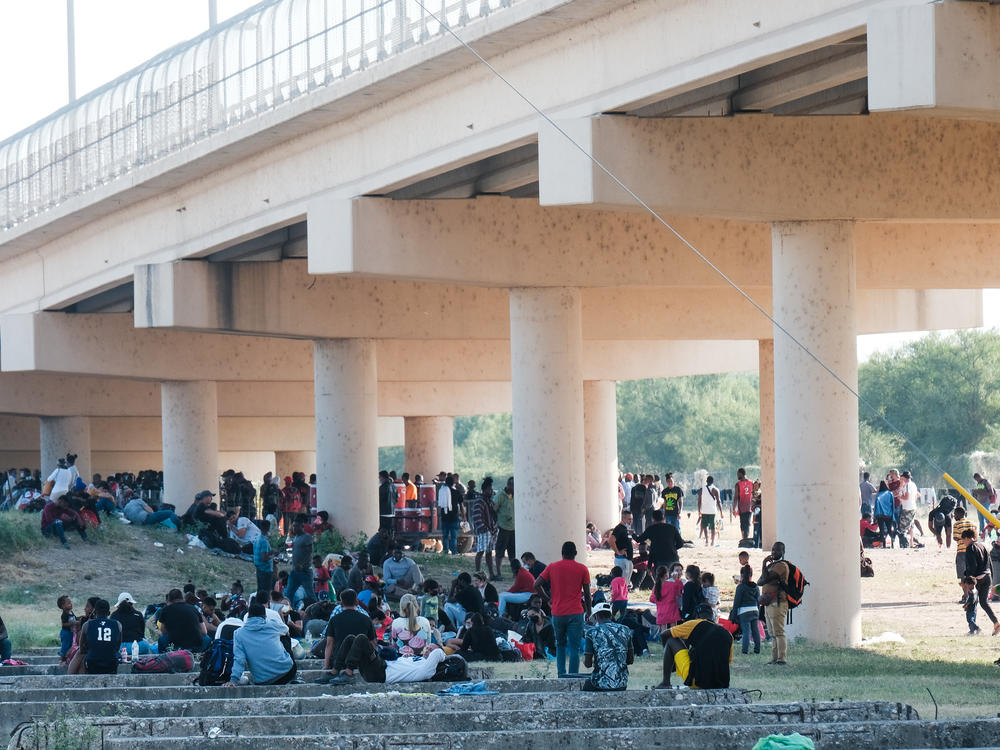Section Branding
Header Content
The Biden Administration Is Fighting In Court To Keep A Trump-Era Immigration Policy
Primary Content
As the Biden administration moves quickly to expel migrants camped under a bridge in Del Rio, Texas, its plan depends on a controversial Trump-era policy put in place in the early days of the COVID-19 pandemic to speed up removals.
Thousands of migrants — many originally from Haiti — have been camped out in squalid conditions since last week. Homeland Security Secretary Alejandro Mayorkas visited the site Monday and pledged to ramp up removal and expulsion flights of arriving migrants.
"If you come to the U.S. illegally, you will be returned," Mayorkas said at a news conference. "Your journey will not succeed."
That expulsion plan rests on a rarely used public health law known as Title 42. Immigration authorities say a public health order from the Centers for Disease Control and Prevention allows them to expel migrants crossing the border quickly without giving them a chance to apply for asylum.
President Biden came into office promising a more humane immigration system. Yet his administration has continued to use the Title 42 policy — and defend it in court — despite mounting pressure from immigrant advocates.
How did the policy come about, and how is it being challenged in court?
The Trump administration had long argued that migrants coming across the southern border did not qualify as refugees fleeing persecution and therefore were not protected by U.S. asylum law. As early as 2019, during an outbreak of mumps, well before the coronavirus pandemic, White House adviser Stephen Miller reportedly pushed for using Title 42 to turn back would-be migrants, according to The New York Times.
By March 2020, with coronavirus spreading rapidly in the U.S., the administration decided to invoke Title 42 to clamp down on the border.
The government expelled some 9,000 unaccompanied children who crossed the border before a federal judge in November ordered a preliminary injunction aimed at halting the practice. Judge Emmet Sullivan said Title 42 allows officials to block the entry of noncitizens who carry diseases but does not allow expulsions. He ordered an injunction to stop the rapid expulsions, though the U.S. Court of Appeals for the District of Columbia Circuit later stayed his order.
The Biden administration did carve out exceptions for unaccompanied migrant children. It has allowed the majority of parents and children arriving together to ask for asylum. But it has continued to expel many others, including some families and tens of thousands of single adults crossing the border.
Last week, however, Sullivan ordered a similar halt in the use of Title 42 to turn away families with children, setting a two-week deadline for the administration to comply.
The administration is appealing that decision as well.
Why is the Biden administration trying to keep the Title 42 policy alive?
The Biden administration defends its use of Title 42 as a public safety measure to slow the spread of the coronavirus.
"Title 42 is not an immigration authority, but a public health authority," Mayorkas said. "To protect the American public. To protect the communities along the border. And to protect the migrants themselves."
But physicians and immigrant advocates said that position is merely a pretext to remove migrants from the country quickly — with the most recent example being those sheltered under the international bridge at the Del Rio port of entry.
"What people need to understand is that, yes, the Haiti situation in Del Rio is awful," said Lee Gelernt, an attorney with the American Civil Liberties Union who has fought Title 42 in court across two administrations. "But it's only the most recent dramatic illustration of what this Title 42 policy can do."
Although the Biden White House undid some of former President Donald Trump's harshest immigration policies, it is seeking a balance to deter more migrants from crossing the border.
On Sunday, U.S. Border Patrol Chief Raul Ortiz said the government had moved 3,300 individuals from the bridge camp to migrant processing facilities in San Antonio, Laredo and Eagle Pass, Texas. Ortiz said the local school system had lent buses to the effort, which he said was being carried out in a "humane and timely manner."
Officials said just over 300 have been removed on flights to Haiti.
"We are working around-the-clock to expeditiously move migrants out of the heat, elements and from underneath this bridge to our processing facilities in order to quickly process and remove individuals from the United States consistent with our laws and our policies," Ortiz said.
Critics on both the left and right have lashed out at the administration's handling of the situation in Del Rio. Hard-liners and some Republicans said the Biden administration is letting in too many migrants, while some Democrats said the White House is abandoning migrants.
What comes next?
Immigrant advocates said they will keep fighting in court to end Title 42. They said it is particularly cruel to implement it in this case since Haiti is still recovering from a recent earthquake and major political turmoil.
The ACLU's Gelernt said that the rights organization is "extremely disappointed but not shocked" by the Biden administration's decision to appeal the latest Title 42 ruling to the D.C. Circuit.
"We would have thought that the Biden administration, given how much they're talking about wanting a humane asylum system, would have at least grappled with the decision," he said.
Instead, the Biden administration is fighting in court to preserve one of the Trump administration's most hated border policies.
Copyright 2021 NPR. To see more, visit https://www.npr.org.


